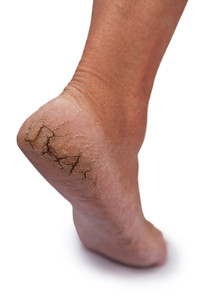 Patients who suffer from the unsightly condition that is known as cracked heels may be familiar with the pain and discomfort, which may be associated with this ailment. It is defined as deep cracks, which may also be known as fissures, which form on the heel of the foot. It may originate from wearing shoes that have open backs, which do not provide adequate support the heels need, in addition to having medical conditions such as obesity, psoriasis, or dermatitis. Research has shown that patients who experience underactive thyroid imbalances may develop cracked heels. This may be a result of sweat glands, located in the feet, being under regulated, and can possibly cause the skin to become excessively dry. If you have developed cracked heels, it is strongly advised to consult with a podiatrist who can determine the cause of this condition and guide you to begin correct treatment.
Patients who suffer from the unsightly condition that is known as cracked heels may be familiar with the pain and discomfort, which may be associated with this ailment. It is defined as deep cracks, which may also be known as fissures, which form on the heel of the foot. It may originate from wearing shoes that have open backs, which do not provide adequate support the heels need, in addition to having medical conditions such as obesity, psoriasis, or dermatitis. Research has shown that patients who experience underactive thyroid imbalances may develop cracked heels. This may be a result of sweat glands, located in the feet, being under regulated, and can possibly cause the skin to become excessively dry. If you have developed cracked heels, it is strongly advised to consult with a podiatrist who can determine the cause of this condition and guide you to begin correct treatment.
If the skin on your feet starts to crack, you may want to see a podiatrist to find treatment. If you have any concerns, contact Dr. David Ungar from Personal Foot Care. Our doctor can provide the care you need to keep you pain-free and on your feet.
Cracked Heels
It is important to moisturize your cracked heels in order to prevent pain, bleeding, and infection. The reason cracked heels form is because the skin on the foot is too dry to support the immense pressure placed on them. When the foot expands, the dry skin on the foot begins to split.
Ways to Help Heal Them
- Invest in a good foot cream
- Try Using Petroleum Jelly
- Ease up on Soaps
- Drink Plenty of Water
Ways to Prevent Cracked Heels
- Moisturize After Showering
- Skip a Shower
- Keep Shower Water Lukewarm
- Don’t Scrub Your Feet
If you are unsure how to proceed in treating cracked heels, seek guidance from a podiatrist. Your doctor will help you with any questions or information you may need.
If you have any questions, please feel free to contact our office located in Farmington, MI . We offer the newest diagnostic and treatment technologies for all your foot care needs.

